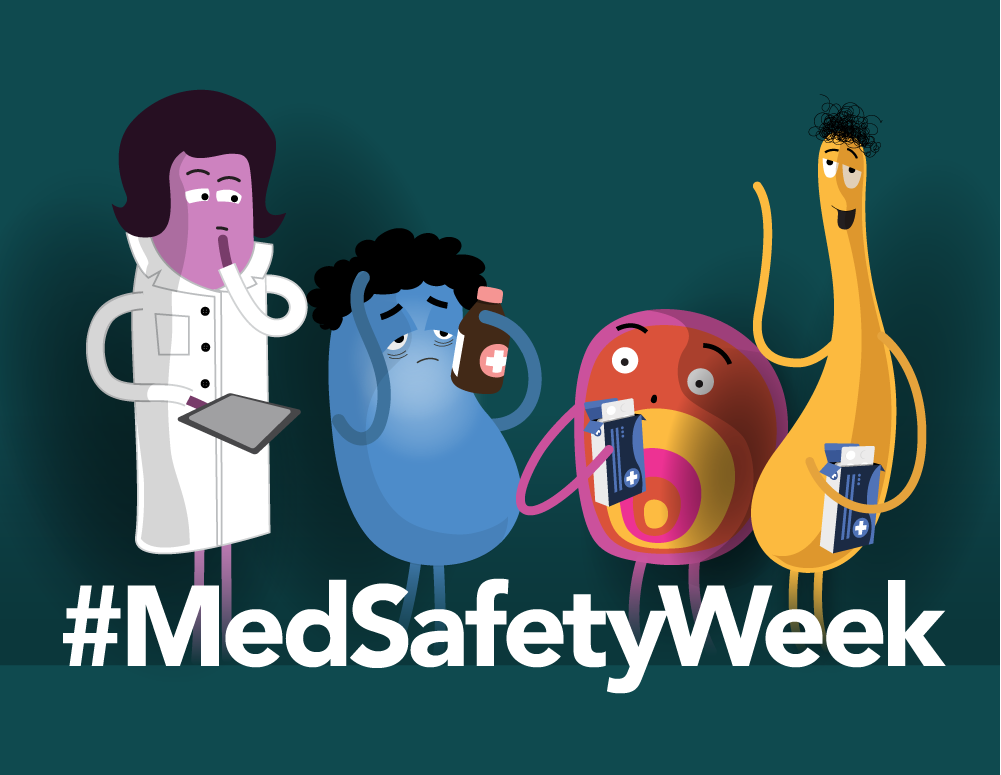
Making sure your medicine is safe at home
Peer reviewed by Dr Krishna Vakharia, MRCGPLast updated by Victoria RawLast updated 25 Oct 2024
Meets Patient’s editorial guidelines
- DownloadDownload
- Share
- Language
- Discussion
- Audio Version
If you've ever rummaged through the back of your medicine cabinet for painkillers, you may find half-finished packs of tablets you took for a bad back some time ago, or a bottle medicine you opened a few weeks back. For #MedSafetyWeek we have a look at what you need to know about making sure your medications are safe and effective to take.
In this article:
Video picks for Medicine information
#MedSafetyWeek is an annual campaign organised by the Medicines and Healthcare products Agency (MHRA). This encourages you to report any suspected side effects from medicines, a medical device incident, or if you believe a product isn't working as intended. The MHRA Yellow Card Scheme helps to detect and resolve potential safety issues with medicines and healthcare products.
#MedSafetyWeek 2024 (4-10 November)

Continue reading below
What is an expiry date?
The expiry date of a medicine is the latest date that the manufacturer guarantees that the medicine will be as effective - and as safe - as when it was issued. It's a legal requirement for all medicines in the UK to have an expiry date.
Manufacturers tend to pick arbitrary expiry dates which are one or two years after the manufacture of a batch of medicines. They check them on that date to ensure the medicine is stable and works at the dose it's prescribed.
Sealed packaging
Back to contentsWhether or not the package is adequately sealed can change how long it stays safe for. Light, variations in temperature and moisture can affect the stability of a medicine. That's why your medicine cabinet is a fairly good place for many products, because it's dark and does not usually have big temperature fluctuations.
Many medicines come in foil blister packs, which keep moisture and light out. The expiry date guarantees that as long as the blister isn't opened, they will still be effective up to that time.
However, if the packaging that surrounds the medicine - as opposed to the cardboard box it is in - is opened, that expiry date cannot be guaranteed. Likewise, tablets in bottles can never be guaranteed past their expiry date.
Continue reading below
Temperature of the medicine
Back to contentsAnother key variable is temperature. Some medicines - usually non-tablet forms - need to be kept in the fridge. If you leave them out by mistake, they may be less safe or less effective even before their expiry date is reached.
How expiry dates affect other types of medicines
Back to contentsAny medicine that contains preservatives - eye drops are a common example - may not be safe once it has passed its expiry date. That's because the preservatives are added to avoid harmful bacteria growing in the liquid - which can cause damage to your body, especially in sensitive areas like eyes.
Sometimes, a shortage of supply means the NHS and national drug safety agencies need to check and see whether a medicine is still safe. Importantly, liquids may have two dates - an expiry date if unopened, and a shorter time-frame for use once opened - take notice of both.
Continue reading below
What to do with expired medicines
Back to contentsIf you have unused medicine that has expired, speak to your pharmacist. Your pharmacist cannot re-issue medicines to other people, even if the packet is unopened, for safety reasons. However, they can often dispose of it safely for you.
If you have any one of a range of long-term conditions such as high blood pressure, raised cholesterol, diabetes, asthma, chronic kidney disease or heart disease, you may be taking several regular medicines. Taking these medicines exactly as prescribed means you'll get maximum benefit and protection from them. And taking steps to manage and organise your medicines properly will make this a lot easier.
Although they aren't strictly medicines, sun creams and lotions have an expiry date for a reason. The protection they provide becomes much less effective over time, especially if they've been opened or left out in the sun. Get rid of sunscreen at the end of every summer season or at least as soon as it reaches its expiry date.
It's good to do a regular clean out of your medicine cabinet. You might want to put a reminder in your diary to do this every six months - or more often if you take multiple medicines. And if you're not sure whether a medicine is safe, do not take it.
For more information about #MedSafetyWeek and the Yellow Card scheme for reporting suspected side effects from your medicines visit yellowcard.mhra.gov.uk.
Never take someone else's prescription medicine, or share yours with anyone else. Keep all medicines out of sight and reach of children. Always read the patient information leaflet (PIL) or instructions that come with any medicine or medical device. This will provide important details about potential side effects, risks, and how to use the product correctly.
With thanks to 'My Weekly' magazine where this article was originally published.
Patient picks for Medicine information

Treatment and medication
Practical ways to manage your medicines at home
Research indicates that many people do not take their medications as recommended, and it can be especially difficult for those who struggle with memory or have multiple medications to remember. Here we look at the tools that can help make taking medication easier.
by Amberley Davis

Treatment and medication
Antibiotic resistance: a hidden health crisis
If you have a bacterial infection, your doctor may prescribe antibiotics. However, unnecessary use of antibiotics can weaken their effectiveness, leading to antibiotic resistance and making future infections harder to treat. Doctors and other appropriately qualified health professionals will only prescribe antibiotics where there is a critical need.
by Victoria Raw
Continue reading below
Article history
The information on this page is peer reviewed by qualified clinicians.
Next review due: 24 Oct 2027
25 Oct 2024 | Latest version
28 Sept 2022 | Originally published
Authored by:
Dr Sarah Jarvis MBE, FRCGP

Ask, share, connect.
Browse discussions, ask questions, and share experiences across hundreds of health topics.

Feeling unwell?
Assess your symptoms online for free
Sign up to the Patient newsletter
Your weekly dose of clear, trustworthy health advice - written to help you feel informed, confident and in control.
By subscribing you accept our Privacy Policy. You can unsubscribe at any time. We never sell your data.